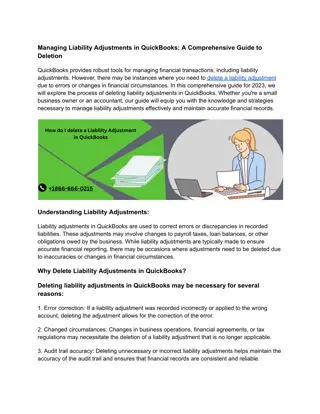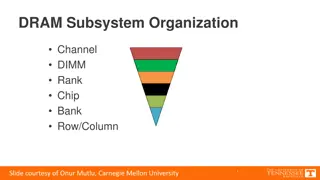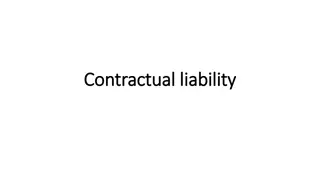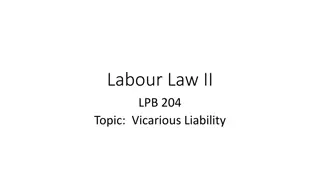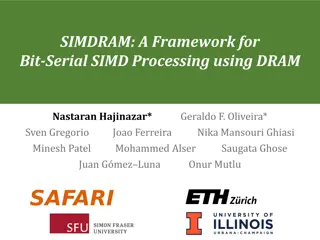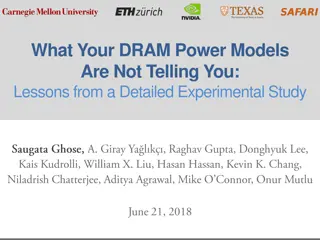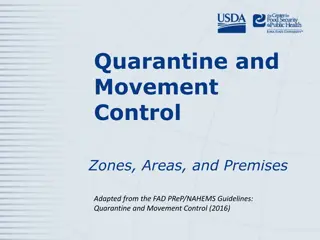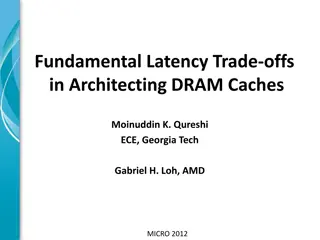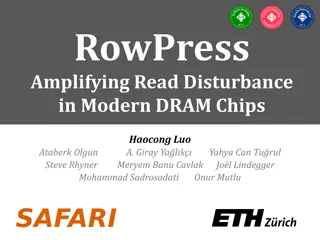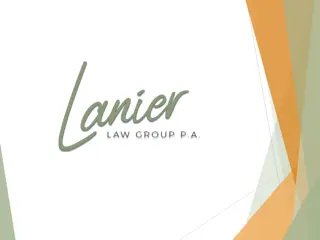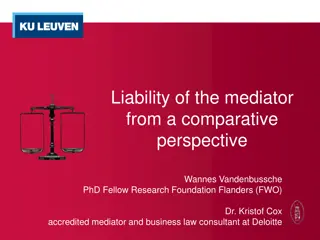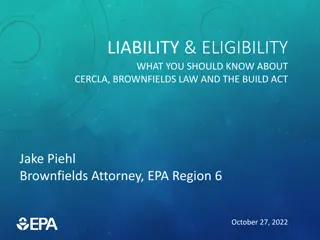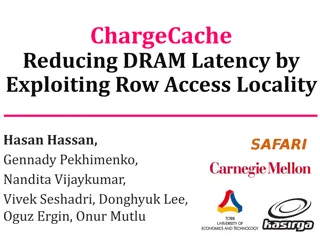Dram Shop Act and Premises Liability for Bar and Tavern Owners
Understanding the liabilities and responsibilities of bar and tavern owners under the Dram Shop Act based on the case of Build It and They Will Drink, Inc. v. Strauch. The act outlines exceptions where licensees can be held civilly liable for selling alcohol to minors or visibly intoxicated individuals. The case highlighted the importance of foreseeability in establishing liability, even for unpredictable injuries caused by intoxicated persons.
Download Presentation

Please find below an Image/Link to download the presentation.
The content on the website is provided AS IS for your information and personal use only. It may not be sold, licensed, or shared on other websites without obtaining consent from the author. Download presentation by click this link. If you encounter any issues during the download, it is possible that the publisher has removed the file from their server.
E N D
Presentation Transcript
DRAM SHOP ACT & PREMISES LIABILITY FOR BAR AND TAVERN OWNERS BY CHRISTOPHER J. FORREST BENJAMIN E. CURRIER MILLER & STEIERT, P.C. 1901 W. LITTLETON BLVD. LITTLETON, CO. 80120 303-798-2525
C.R.S. 12-47-801 DRAM SHOP ACT No licensee is civilly liable to an individual due to sale or service of alcohol, except when: Licensee willfully and knowingly has sold or served alcohol to A person under 21, OR A person who was visibly intoxicated
POSITIVE ATTRIBUTES OF THE STATUTE 3rd Party Liability limited to $280,810.00 (per person injured). Statute of limitations is 1 year. No claims by the person who is sold the alcoholic beverage or his or her estate only third persons. Must show high level of intent willful and knowing service but can be proved by circumstantial evidence
LIABILITY If the licensee willfully and knowingly sells to: Person under 21, OR Person who was visibly intoxicated Licensee will be responsible for damages to third persons, even if the conduct was unforeseeable, impossible to predict. BUILD IT AND THEY WILL DRINK, INC. V. STRAUCH
BUILD IT AND THEY WILL DRINK, INC. V. STRAUCH COLORADO SUPREME COURT DECISION 2011 Facts New Year s Eve Party at club. Dickerman bought VIP Lounge Package Comp. Champagne, unlimited bottle service, access to VIP room with unsupervised self-service bar. Guests told to mix their own drinks. Employees were monitoring doorways and checking wristbands. Witnesses testified that patrons in general were: Stumbling into walls, falling down, throwing drinks, vomiting, taking off clothes, passing out! Dickerman was escorted from nightclub for breaking a light fixture, yelling at patrons and vomiting. Dickerman was then RE-ADMITTED to club. Strauch leaves club with his date and about a block-and-a-half away Dickerman comes screaming behind him yelling obscenities wielding a knife. Dickerman then stabs Strauch, severely injuring him. There was no evidence that Strauch and Dickerman had been involved in any confrontation in the bar.
MAJOR NEW HOLDING OF BUILD IT: Foreseeability that sale of alcohol would lead to the specific resulting injury is not necessary to establish liability! Licensee who violates Dram Shop Act may be liable for a wide range of unpredictable injuries to a third person that result from the intoxicated person s conduct. Build It and They Will Drink, Inc. v. Strauch, 253 P.3d 302 (Colo. 2011) Build It left open the possibility of separate premises liability claims against a bar owner.
PREMISES LIABILITY Three types of persons on premises: Trespasser enters or remains on land without consent (duty not to willfully or deliberately injure). Licensee enters or remains on land for licensee s convenience pursuant to landowner s consent (duty to warn against dangers actually known). Invitee (bar/tavern customers) enters or remains on land to transact mutually beneficial business or at owner s representation that public is requested or expected to remain.
PREMISES LIABILITY (CONT.) Tenant may be a landowner for purpose of premises liability Sundheim v. Board of County Commissioners, 904 P.2d 1337, 1350 (Colo. App. 1995) No caps on economic damages for premises liability suits. Caps or non-economic losses (pain and suffering) are higher than Dram Shop Act = $468,010.00
INVITEE/CUSTOMER Business Owner s Obligation to an Invitee (customer) Duty to take reasonable steps to protect against dangers known or should have known. Examples: Lombard v. Colorado Outdoor Education Center, Inc., 187 P.3d 565 (Colo. 2008) Ladder to loft not built to code Supreme Court held that building code violation can be used to prove knowledge of danger. Land owner could be liable to a plaintiff under the premises liability statute if the landowner had constructive notice of a danger Observatory Corp. v. Daly, 780 P.2d 462 (Colo. 1989) Assault by one bar patron against another - Plaintiff must prove that patron constituted an unreasonable risk of harm to persons legitimately on the tavern premises. Taco Bell, Inc. v. Lannon, 744 P.2d 43 (Colo. 1987) Armed Robbery - Fast food restaurant had legal duty to take reasonable measures to protect its patrons from consequences of criminal acts on part of unknown third persons, where there had been ten armed robberies at particular restaurant in three previous years
OTHER CONDITIONS WHICH MAY IMPLICATE PREMISES LIABILITY STATUTE Spilled milk Lawson v. Safeway, Inc., 878 P.2d 127 (Colo. App. 1994) Melting snow on steps Henderson v. Master Klean Janitorial, Inc., 70 P.3d 612 (Colo. App. 2003) Dog bites Wilson v. Marchiondo, 124 P.3d 837 (Colo. App. 2005) Flying hockey pucks Tenyck v. Roller Hockey Colorado, Ltd., 10 P.3d 707 (Colo. App. 2000) Sponsored activities towing an inner-tube around a frozen lake. Wycoff v. Grace Community Church of the Assemblies of God, 251 P.3d 1260 (Colo. 2010)
PREMISES LIABILITY V. DRAM SHOP ACT Even though Dram Shop Act states that it is an exclusive remedy, the Build It case from the Colorado Supreme Court indicates that separate premises liability claims (with risk of higher damage claims) may still be pursued against a tavern owner.
RECENT TRENDS WITH LOCAL LIQUOR LICENSING AUTHORITIES


